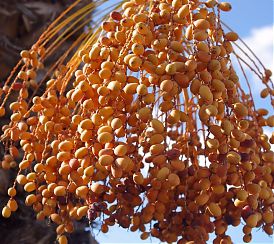TUNISIA, PRODUCTION OF DATES WILL FACE DIFFERENT CHALLENGES


A study conducted by the Arab Organization for Agricultural Development (OADA) has revealed that the dates sector in Tunisia will face, during the next decade, several internal challenges including essentially an excess of production on the local market, in addition to overlap of the date collection period with the month of Ramadan of the year 2025. Among the external challenges of the date chain, the study mentions the self-sufficiency of the Moroccan market that has imported half of its demand from Tunisia. Tunisia will lose its position on the Moroccan market, as Morocco prepares to plant one million palm trees under the “Green Morocco” program, the study said, adding that Morocco aims to achieve self-sufficiency by 2025. The competition of the Algerian dates (Deglet Nour) is another challenge that Tunisia faces, especially since the date production of Algerian has accelerated the growth to reach, in 2014, 850 thousand tons, against 427 thousand tons in 1999.
In addition, imports from the European market are stagnant (Tunisia occupies 37% of the European market). The same study found that the Indian market imports 36% of its dates needs from Tunisia, while Tunisia’s share of the Asian market does not exceed 3%. He also revealed that the production chain of dates in Tunisia is facing structural problems in production: fragmentation of ownership, production based on the Nour deglet variety and aging of over one million palm trees. The study then addresses the problems of the continuous increase in production costs and the difficulties hampering agricultural mechanization within the old oases. It is also the weakness of the financial resources of small farmers, the rate of supervision, the lack of guidelines in the field and technical references to new technologies in addition to the abuse of natural resources. The document recommends the establishment of an action program to improve production, productivity and quality. The authors of the study call on farmers to join agricultural service cooperatives and adopt agricultural mechanization to control production costs, as well as the diversification of early varieties that can easily be sold on the domestic market. As far as quality improvement is concerned, the document requires greater value for the product by granting quality standards (organic and geographical production). It should be remembered that Tunisia currently has 6 million palm trees that produce 62% of the “deglet nour” variety and 38% of other varieties and average production has reached 201 thousand tons in the last decade.
Source: medNews

